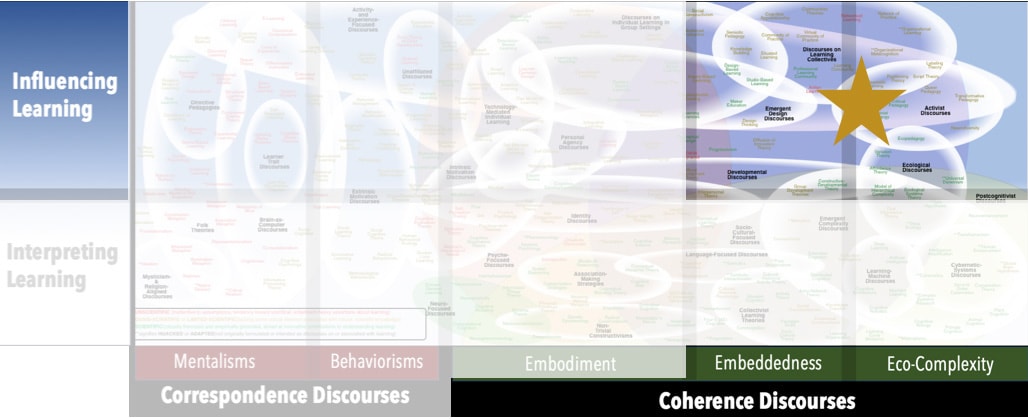Focus
Restructuring formal education to mimic the emergence of collective knowledgePrincipal Metaphors
- Knowledge is … scope of possible actions and interpretations
- Knowing is … networked understandings
- Learner is … a node (individual) in/and a network (collective)
- Learning is … quasi-random network growth
- Teaching is … permitting, encouraging
Originated
2000sSynopsis
Rhizomatic Learning draws on the notion of Rhizome (under Post-Structuralism), which is in turn based on the metaphor of rhizomes, plants that propagate by continuously growing underground stems that put up shoots and put down roots at different intervals. This image of adventitious spreading is offered as an alternative to the popularly assumed images of orderly, linearized modes and structures associated with goal-directed theories of learning and models of education. Subverting traditionalist emphases on pre-determined objectives and designed lessons, Rhizomatic Learning asserts that learning is most effective when it evolves continuously with the tasks and interests at hand. There has been a recent surge in interest in Rhizomatic Learning associated with the affordances of information and communication technologies.Commentary
Rhizomatic Learning is seen by some critics as an attack on or rejection of formal education. While the rhizome is generally acknowledged as a useful metaphor to illustrate and interpret the emergence of collective knowledge and the structure of personal understandings, it is not clear that a descriptive metaphor (that highlights chance) can be used as a basis for restructuring formal education (that is defined by intention).Authors and/or Prominent Influences
Gilles Deleuze; Félix GuattariStatus as a Theory of Learning
Rhizomatic Learning is not a theory of learning, although it is developed around a visual metaphor (the rhizome) that is presented as interruption and alternative to the interpretations of learning that tend to dominate discussions of formal education.Status as a Theory of Teaching
Rhizomatic Learning is principally a theory of teaching.Status as a Scientific Theory
Rhizomatic Learning is not associated with a formal research program or a body of evidence.Map Location

Please cite this article as:
Davis, B., & Francis, K. (2022). “Rhizomatic Learning” in Discourses on Learning in Education. https://learningdiscourses.com.
⇦ Back to Map
⇦ Back to List
